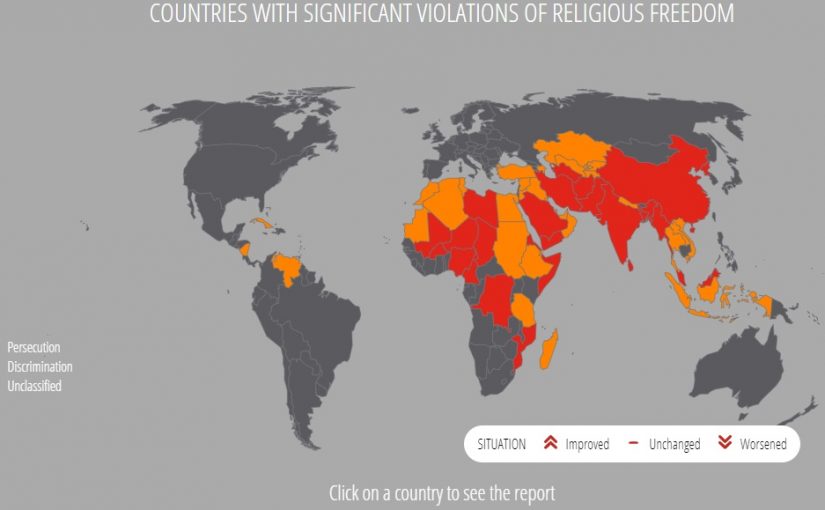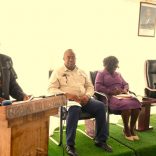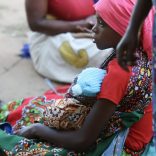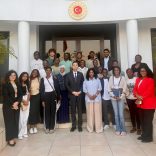Mozambique receives two million doses of BCG vaccine
Mozambique: Islamic extremism main threat to religious freedom in country – ACN

Image: ACN Foundation
Religious persecution, crime and violence have worsened in Mozambique, where the main threat is Islamic extremism, according to the Catholic ACN Foundation report on religious freedom in the world, released on Tuesday.
The study, which assessed 196 countries between mid-2018 and 2020, places Mozambique among the 23 African nations where religious freedom is threatened and warns of the risk of progression of “transnational jihadism” on the African continent, led by “about two dozen groups” that operate and cooperate “increasingly actively” in 14 countries.
It highlights, in this context, Mozambique’s entry into “the sinister club” of countries that host the most active Islamic groups in sub-Saharan Africa, noting the deterioration of religious freedom with persecutions, hate crimes and religiously motivated violence.
The report chose Mozambique as one of the case studies in Africa, considering that the country is experiencing a “cycle of uncontrolled violence” caused by the fundamentalist group Ahlu Sunnah Wa-Jama (locally known as Al-Shabaab), affiliated to Daesh, which is estimated to have killed over 2,500 civilians and displaced over 700,000 people in the last three years.
“From Mozambique, the ‘jihadists’ proclaim to have established “provinces of the Caliphate” in the Comoros, northern Madagascar and, across the Indian Ocean, to Indonesia, Malaysia and the Philippines, the report points out, stressing that “the rise of Islamist extremism in northern Mozambique is a complex and multi-causal phenomenon.”
Among the factors that allow for the “rapid dissemination and recruitment capacity” of ‘jihadist’ networks, the study points to poverty and corruption, weak state structures in the region, lack of education and job opportunities, transnational criminal networks that benefit from the illicit trade in natural resources or drug trafficking, the frustration of the local population at their exclusion from the profits of minerals, repressive actions committed by the security forces and “fundamentalist influences” from countries such as Saudi Arabia and Somalia.
“These roots, stimulating the rise of groups like Al-Shabaab, reflect a similar pattern and dynamic of Islamist radicalisation and extreme violence observed in regions like the Lake Chad Basin, the Sahel and Somalia,” the study notes.
The report highlights that the reaction to the socio-economic roots of the conflict, “so far has been deeply militarised, contributing to a new spiral of violence”. [To read the full, detailed report in English, you may use this link: https://rfr.acninternational.org/reports/mz/ ]
Also according to the report, in Africa, 42% of countries (23 out of 54) have violations of religious freedom, with 12 states with extreme religious-based persecution.
The study also addresses the impacts of the Covid-19 pandemic on religious practice, stating that in the first months, terrorist groups and ‘jihadists’ took advantage of governments’ focus on the pandemic to increase their violent attacks, consolidate territorial gains and recruit new members.
“Numerous propaganda publications by al-Qaeda, Daesh and Boko Haram on the Internet described Covid-19 as God’s punishment for the “decadent West”, promised immunity from the virus and assured a place in paradise for ‘jihadists’,” the report states.
On the other hand, as a result of social distancing regulations imposed to contain the spread of the virus, in most African countries places of worship remained closed for several months, including during Holy Week for Christians and during Ramadan for Muslims.
This measure was met with protests in some countries, notably in Mozambique and Gabon, where tensions arose when the Government extended the closure of places of worship despite the reopening of markets, schools and hotels.
In Liberia, Guinea-Bissau and Zambia, there were cases where religious leaders decided to keep churches and mosques closed despite Government permission to reopen.
In Mali and Senegal mosques reopened for Ramadan celebrations, but the Catholic Church leadership decided not to reopen places of worship due to the high number of reported cases of Covid-19.
Globally, one in three countries in the world do not respect religious freedom and 67% of the world’s population (5,200 million) live in countries with serious violations.
In 43 countries (2.932 million people), religious freedom is threatened by authoritarian governments, in 26 countries (1.252 million people) by Islamic extremism and in four countries (1.642 million people) by ethnic-religious nationalists.
Founded in 1947 to help war refugees, the ACN Foundation (Aid to the Church in Need) is an international Catholic organisation that supports over 5,000 pastoral projects in more than 145 countries each year.












Leave a Reply
Be the First to Comment!
You must be logged in to post a comment.
You must be logged in to post a comment.